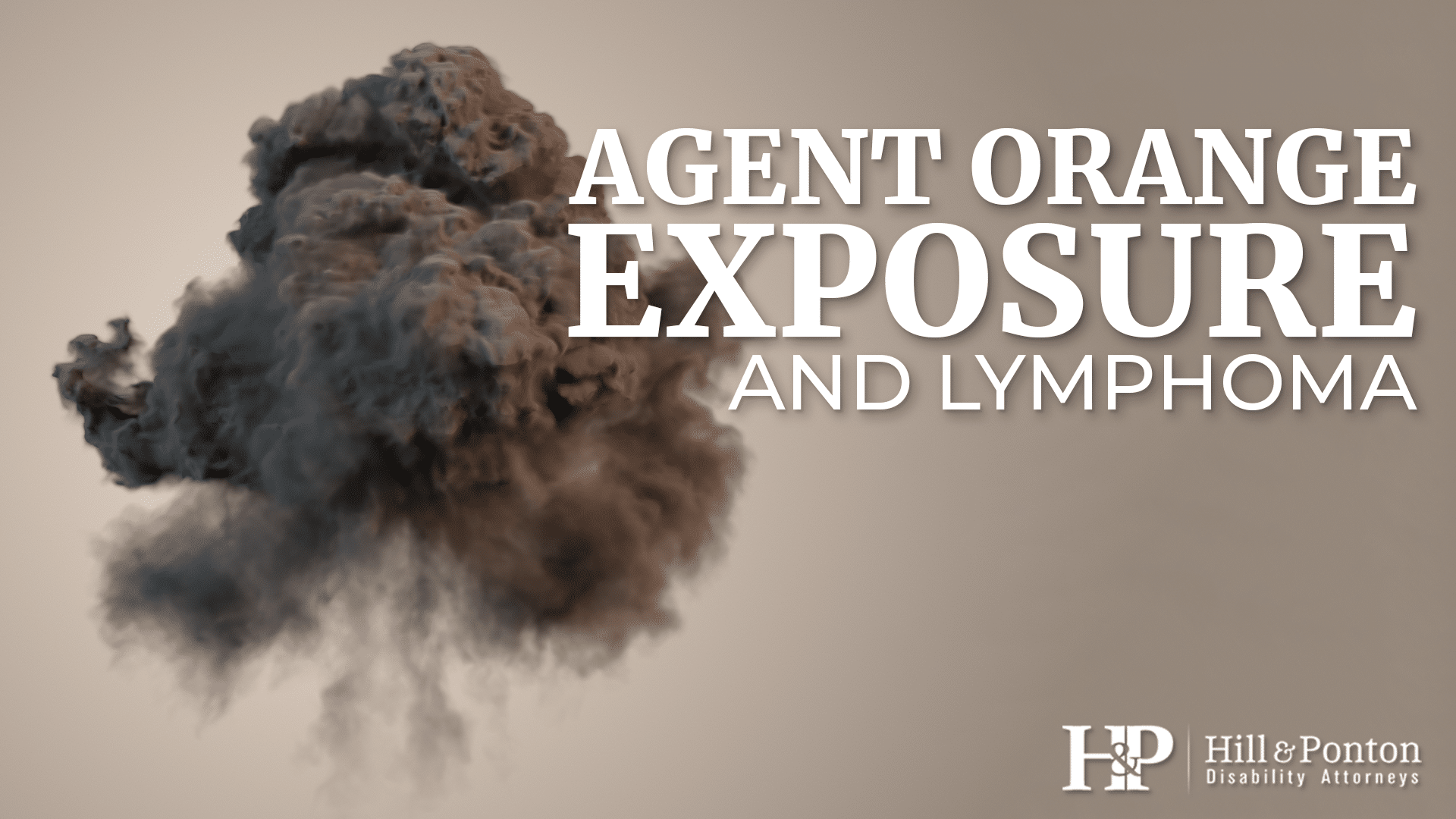Matt Hill and Carol Ponton discuss Veterans Disability claims related to Agent Orange exposure. After years of stating that Agent Orange was only in Vietnam, Veterans have started winning disability claims for exposure in places like Thailand and Philippines. Agent Orange exposure has been shown Learn more about disability claims related to agent orange.
Be sure to follow us on YouTube.
Welcome to another broadcast from Hill and Ponton about VA compensation. Today, we’re going to talk about Agent Orange. I’m here today with Carol Ponton our managing finding partner– whoops, with Carol Ponton who founded Hill and Ponton. And so just to talk about in general with Agent Orange. Most people are aware of it. It was the chemical used in Vietnam to get rid of the foliage. And after decades of research, it was discovered that Agent Orange is deadly not only to foliage but also to humans. It causes all kinds of chronic illnesses. Carol, you’re more familiar with that than I am. It causes a number of different cancers. We have Hodgkin’s lymphoma, non-Hodgkin’s lymphoma, prostate cancer, lung cancer. There are a number of cancers. It also causes diabetes, heart disease. There are a number of things that it can cause. And often these don’t show up until 30 or 40 years after exposure to the Agent Orange. And that’s the problem with these disabilities is they take so long to develop but then they can be so devastating. So the VA finally admitted that Agent Orange does cause these disabilities. And then what they did is they connected these presumptively to anyone who is in Vietnam. So the VA said anyone whose touched the ground in the land mass of Vietnam was presumed to have been exposed to Agent Orange. If someone was presumed to have been exposed to Agent Orange and then developed one of those diseases that Carol just listed, like diabetes, then they get presumptively connected. The veteran doesn’t have to show any medical evidence connecting one to the other. So with those disabilities and for Vietnam veterans that was a huge relief. But for years the VA, and frankly the Department of Defense, perpetuated the myth that the only two places that ever had exposure to Agent Orange was where it was produced in Gulfport, Mississippi and Vietnam. Their stance was that it was never placed anywhere else. And so what we’re seeing more and more of now is the VA finally admitting it was other places. Carol, why don’t you tell us– They aren’t freely admitting that. It’s something that we have to prove, unfortunately. And one example is Thailand. A number of veterans have claimed that they had been exposed to Agent Orange while serving in Thailand. And the VA has denied those cases. We have a number of those. I think my clients were basically mechanics that were, aircraft mechanics, stationed there. And they said that they not only worked but lived right along the edge of the base. And that’s where the Agent Orange was sprayed. The reason they used Agent Orange is so that they could clear out the land and the Vietcong wouldn’t be able to sneak up on them. So they clearly all around the edge of the base was sprayed with Agent Orange to clear it out. So the VA is accepting that if your service there was as a dog handler where you were walking the base perimeters in order to look for Vietcong then they’ll find you service connected. But if anything else, they’re denying. So we are finding that we’re able to prove that a lot of the veterans were exposed to Agent Orange in Thailand by where they were either working or living on the base. And so as she said the VA finally conceded that it was used there. But instead of giving the blanket presumption like they did in Vietnam to where anyone who is in a base in Thailand was exposed, they are saying, no only those who are on a perimeter. And as Carol was saying, it’s not as black and white as the VA wants to make it. It’s not just if your military speciality had you on the perimeter, such as a dog handler. But as she said jet mechanics, the VA wants to presume that that jet mechanic was in a hanger the whole time. But in reality, they probably spent a lot of their time out on the flight line, testing jets, fixing jets. And the flight lines just happened to be near the basis perimeter in Thailand. I had a case with a cook where he came to me, and his only foreign service was at an Air Force Base in Thailand. And I said look, we had to show that you were near the perimeter. I don’t know how we do this with a cook. And he said well, when we were training and we were drilling, and we had to take if there’s a threat to the base or there was something to where it was all hands in ready positions, he said I would be a bunker. And the bunker was right on the perimeter. And he said that happened at least once a week. So there he was for a full year at least once a week on the perimeter. So in these cases it’s really important that first of all, you don’t take no as an answer if you were a vet in Thailand. And second of all that you have to develop evidence. I think some of the best evidence is statements by the veteran himself. And then if you’re a veteran, and you can find other friends who were there with you getting them to submit statements. Unfortunately, a lot of cases I’m handling with Thailand vets are widow cases where the veteran has already died from heart disease or complications to diabetes. And so then it becomes a little bit more difficult to develop the evidence. But it’s still possible. In one case where I had a jet mechanic, we were able to find the veteran’s former unit and reach out to airmen who served with him and then were able to service connect it that way. Carol, have you had similar experiences? I’ve had them, but they’ve been not as much in Thailand. They’ve been veterans who clearly weren’t stationed in Vietnam. But they were stationed on ships or boats that either went into the inland waterways or not. And that’s the thing that we have to prove. And like you said, a lot of these cases are widow’s cases where the widow didn’t know exactly where they went. And we have to recreate what ship they were on. Did the ship go in the inland waterways? Were there reasons that the veteran may have gone into Vietnam? I had one client who worked, he was on a ship off the cost of Vietnam. The ship never came into Vietnam. But as part of his job, he would fly into Vietnam to deliver mail, packages, and things like that. And fly back out. We get a statement from him. And then we had a corroborating statement from his cousin who happened to meet him there just for an hour or two and talked while they were in Vietnam. So these cases can be won. It’s just figuring out what the evidence is and getting it into the record. And that’s the key is getting that evidence into the record. As generous as the VA has been with the presumption of Vietnam stepping on the land mass then you get the presumption they are the opposite when it comes to anyone who didn’t step on the land mass in Vietnam. I’ve had several clients now who served in the Philippines, in Subic Bay at Cubi Point, and these were marines who were patrolling the docks and the ammo dump back up in the jungle. And they said, hey, look there’s Agent Orange there. There are these canisters with herbicide that we were patrolling and we were guarding. And the VA denied it up and down. And we had to show not only through lay evidence of the soldiers, but we actually had to show where the Agent Orange was shipped to Subic Bay from New Zealand. So the VA could maintain that look, the only places the US had it was in Gulfport, Mississippi and Vietnam. Well, we can could turn around and say, OK, well, maybe you didn’t send it here but New Zealand did. And then that and the combination with the lay statements we could finally get the VA to concede. But the further you get away from Vietnam the harder it is. But Thailand is a place that Carol and I both see right now where there’s lots of vets who are exposed. And those vets need to make sure, the vets and the widows, frankly, need to make sure that they’re fighting for those benefits. And I agree Matt. Thailand and Subic Bay, I think there were quite a few people in Subic Bay exposed to it. And the other thing that I would make sure the veterans know is you may not win on your initial claim or even on your appeal to the VA. You may have to go to the board of Veterans Appeals. But they shouldn’t give the claim up. A lot of cases are approved when you go up to the Board of Appeals or the Court of Appeals for Veterans Claims. So that’s another thing I’d make sure the veterans know. There are a lot of cases that the people who work at the regional office are not going to approve but that most of them will be approved at the Board of Veteran’s Appeals. And it’s so sad when veterans stop their appeal and don’t go further because the next step is the winning step in many cases. Yeah, it’s very frustrating. As we see in the papers right now, veterans are waiting two years just for that initial decision. So you wait all that time and the VA comes back, and they deny you. And they send you this decision that you can’t even read. It doesn’t explain why they deny you. Like Carol, I see a lot of vets who give up that point. And that’s too bad. Because these cases are worth appealing. You fought for our country. You were stationed in places where they were using Agent Orange even if they don’t want to admit it. And it’s important that you keep fighting to get those benefits. Well, I just also to make sure they understand, because that’s another thing. A lot of veterans don’t understand how the appeal process works. And the fact of the matter is, if you apply, and you have a new claim and you’re denied, and then you appeal it, it still goes before the regional office. What I’m telling you is, it’s often hard to win there. And you need to take the next step and go onto the Board of Veteran’s Appeals. So knowing where you are in the appeal process and make sure you go as far as you can are really important to veterans. Because if you win, remember, you’re going to get your benefits all the way back to when you filed your claim. So, you’re not going to lose these even though it does take far too long for them to be processed. Well, so in summary, we just want you to remember that Agent Orange was used in many places besides Vietnam. The big place, again, that we’re seeing right now is Thailand. It’s so important that you make sure, even if you weren’t working the perimeter like a dog handler, but you were there, you get a claim in, and then you get all the lay evidence you can between what you yourself saw and did and any statements from friends who can back that up. So for Carol, this is Matt Hill. And we are Hill and Ponton, and we are here representing vets. Thank you.



